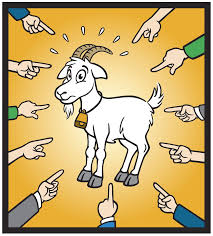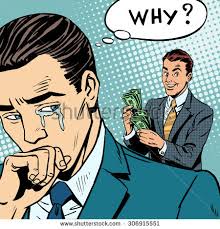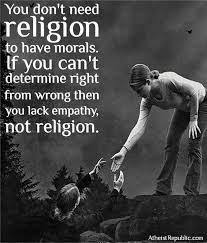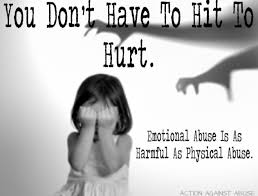
The opposite to the golden child is the scapegoat. Scapegoating is a serious dysfunctional family problem. It is when one (or sometimes more) members of a family are picked out to be blamed for everything wrong that happens in a family, even if they had nothing to do with the event, this is called projection. The narcissistic parents will completely violate the boundaries of this child and project everything “bad” that happens in the family on to him/her and force them take on the blame for collective family problems (even though the scapegoat in the family might only be 3 or 4 years old). They will force other members of the family of origin to do the same thing to ensure that the scapegoat does not find any support from any other member of the family.
There are different reasons that one child is singled out, they might be too independent and noncompliant, the child might be too different from the parent, they might be sensitive and emotional, remind them of a relation they did not like or they might just be weak or vulnerable for some reason and therefore easy to bully. Children of narcissistic parents are often very angry with their parents simply because they are not doing their job as protector, carer and provider, but at the same time are extremely interfering and controlling. This generates a lot of anger and resentment and since children of narcissistic parents know that there is no point in getting angry with their parents, that anger has to be deflected/projected onto someone else. It is classic bullying, “I am hurting, I cannot hurt the person who is hurting me, so I will attack this small vulnerable person instead and that will temporarily make me feel better, more in control”.
The narcissistic parents of a dysfunctional family will actively encourage the other children in the family to redirect the anger that that is held for them onto the scapegoat child. The parents will lead by example by taunting and hurting the scapegoat child. This is called mobbing or flying monkeys. All members of the family are affected, the scapegoat will learn that they are at the bottom of the pile and are a dumping ground for all. The dynamic of a “good” child and a “bad” one can continue into adulthood. Aggression, the use of force against another human being is always present in scapegoating it can be through rudeness, humiliation, rage or constant negative feedback. The target of scapegoating feels wrongly persecuted and disempowered because whatever they do they are always wrong. If they are good they are bad and if they are bad they are bad too and even if they are paralysed with fear of doing something wrong – they are still wrong.
These roles have been assigned by the parent(s) and have little or nothing to do with the individual themselves. The scapegoat is probably selected because they are the easiest to bully and manipulate. It is not their fault, they didn’t do anything wrong, but they are raised thinking that they just stumble from one self-made atrocity to the next, without ever knowing what they have done wrong.
If one of the siblings feels inclined to stand up for the scapegoat, the family will swing in and let that child know that it is not acceptable behaviour to support the scapegoat and will threaten punishment for offering support as that would destroy the structure or the dynamic of the family that the parent or now collective “family” has deemed “acceptable or correct”, so the system is self-policing.
Any external defence of the scapegoat will probably bring more punishment on to the scapegoat as the parent will see that the scapegoat has done something to make her/him look bad in public and that is a punishable offense. The scapegoat child was more than likely just being a child but the parent(s) will project their “adult” malevolence onto the child and punishment will inevitably ensue.
The whole sick dynamic is really a form of emotional incest or rape. The scapegoat child will be blamed and held accountable for the parent(s) emotional well-being and will also be denied a childhood.
A narcissistic parent will NEVER support the scapegoat child. It will not matter what happens, whatever the evidence of having been mistreated, the narcissistic parent will always take the side of the other person. S/he will say things like “you must have done something to deserve it”, “how can you be so selfish, you have hurt that person’s feelings” (if you defend yourself), “well of course they ripped you off, you look like an idiot”.
So how can you tell if you are a scapegoat?
- You are held responsible for family problems that you have nothing to do with.
- If you defend yourself, you are disbelieved or incur rage from the family unit in one shape or another.
- Some family members are actively encouraged to be verbally, emotionally or physically abusive to you, while the other members of the family do nothing to defend/support you.
- There is constant projection, a family member shouts abuse at you and then you are accused of being hurtful.
- You are afraid of being “successful” as you know that it will incur the collective wrath of the family, so you deliberately under achieve. To succeed at something is a source of toxic shame.
- Constantly being accused of being the sick, bad, addicted member of the family.
- Being treated with distain or hostility by your family, being excluded from family communications only being told what is going on when they want something from you.
- Any achievement will be belittled, ridiculed and rejected (sometimes punished).
So how do you survive this craziness? Scapegoats often have huge issues around trust and feeling safe in relationships so are susceptible to flight, fight or fawn. This all comes from childhood trauma.
So how can the scapegoat break the spell?
- You need to know where you have come from and distinguish what you were told to believe, rather than what you do believe.
- Get back in touch with yourself, there is an indestructible core inside of you all of the time, re-connect with that person. S/he might be as young as 4 or 5, this person is referred to as “your inner child” in the literature. This young person is very precious and has been subjected to a lot of abuse If you come from a narcissistic family, recognise the fact that you could be taking on generations of neglect/abuse etc. Don’t let your family use you as their dumping ground.
- Get back in touch with who you were when you were little, that is the true you.
- Don’t try to appease the scapegoat family, collectively or individually, it is in none of their interests to let you move out of the role that they have given you – so don’t try, it is not worth it, it will only trigger more pain.
- Don’t ever expect abusive family members to be anything other than abusive family members. Once an abusive family member always an abusive family member.
SO HERE IS THE DIFFICULT PART
- The word is “no”, don’t say yes to everything that they “ask” you to do.
- If someone treats you badly within your family, call them out on it.
- Don’t treat your interaction with your family as a means to an end.
- Take into consideration what your family have told you about yourself in your role as scapegoat, acknowledge the fact that what they have told you is projection of their own pain and problems.
- Trust your instincts, listen to that little voice that says “this is not fair” and let them know that you are no longer prepared to take on their abuse.
- You have been the family punch bag and the bad feelings and opinion that you have about yourself are not “real”,
- Write down what you know to be true about yourself without looking for validation from outside of yourself.
- Don’t try to look for the validation of your abusive an uncaring family, friends and co-workers
- Don’t look for apologies, they will still blame you
- Call people out when they are disrespectful and point back
- Accept that you will never have a healthy relationship with people who treated you as a scapegoat
- Treat yourself with kindness care and compassion
- It will take time to learn how to take care of yourself, but it is do-able and well worth the effort
Narcissists will set you up to fail, they can do things like give you something and then publically accuse you of stealing it, tell you someone’s secret and say that everyone knows about it, so that when you mention it to someone else it makes you look like a malicious gossip etc. They do this because nothing is ever their fault but they know that they cannot randomly blame everyone as that would lose them favour, so they carefully select someone(s) to take the blame for whatever they do and will work diligently through lies a deceit to make sure that everyone believes them. The scapegoat in a lot of cases isn’t aware of stuff that has been attributed to them but notices that certain people treat them with hostility.
A few precautions:
- Don’t be alone with a narcissist if you can avoid it, they won’t abuse you if there are other people around, if you are in company and they ask you to leave the room with them, make your excuses.
- Don’t accept presents or stuff from them (if a narcissist gives you something they consider it a purchase)
- Don’t believe anything that they say (until you have had validation from another source)
- Be aware that you are probably being manipulated at all times
- Don’t look for appreciation or gratitude because you won’t get it (unless it is in a public setting but it will never be sincere)






